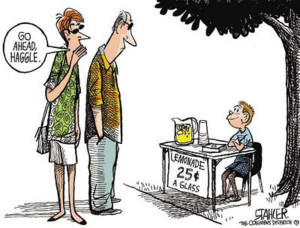With the recent rise of Donald Trump, much talk has come about our nation’s leaders selling us short – leaders who fail to understand “The Art of the Deal.” In a world that has tendency to be a zero sum game, topics like attunement, buoyancy, and clarity are important to keep in m ind when dealing with buyers. I came across a Harvard Business Review that discussed two primary schools of thinking when it comes buyer/seller relationships.
ind when dealing with buyers. I came across a Harvard Business Review that discussed two primary schools of thinking when it comes buyer/seller relationships.
The first is called integrative bargaining. This is when both the buyer and seller work together to try to achieve a beneficial outcome for both. The two parties ideally look for a way that neither party gets the ‘short end of the stick.’ Professor Wheeler of Harvard Business School teaches that opportunities for mutual gain actually exist far more frequently than most think. He nonetheless recognizes that not every situation will allow for such conditions.
He teaches his MBA students that it is important to be cautious of partners who may not have the purest intentions. If the buying party decides to make itself more vulnerable in an effort to grow the total size of the pie, but the selling party chooses to exploit that, obviously the selling side would be cheated in a way.
The alternative mode of negotiation is the ‘more for me, less for you.’ This touches on the caveat emptor mindset, where the seller is looking to prey on buyers with limited information. Also, buyers who will do everything thing they can to get more. This leads to a lack of trust between parties and ultimately value destruction. Wheeler argues that neither parties will be willing to explore value creation efforts if they’re both skeptical of each other’s motives. The analogy of the pie is one he uses often, saying that often times 50% of a significantly larger pie can be worth much more than 70% of a small pie.
I think it’s important for sellers and buyers to pursue mutually advantageous outcomes, while always maintaining a reasonable level of precaution.
It would be hard for me as a seller, to not try and advance myself as much as possible, just because I would be skeptical of the other person’s motives. I think that this is a great idea, and I think that for some people, it would work great, but I know that I would struggle with being able to trust in the other person, just because I would think that they are wired the same as I am.